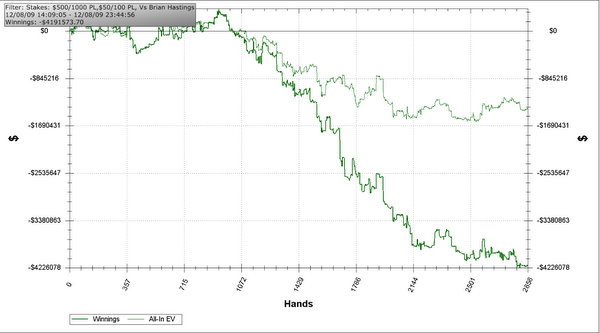Downswings are a common event in poker and heavy losses can often disturb a player’s game. Pot Limit Omaha (PLO) is a very high variance game, one where downswings can last for hundreds of thousands of hands and thousands of dollars (or more) are lost.
There have been some great swings when playing PLO in online poker history; one of which was the famous isildur1 and Brian Hastings (Stinger) heads up match, where isildur ran millions of dollars below expectation.

How can you as a player deal with losses? What are some things you can do to mitigate tilt? And what can you do externally from the poker tables to improve your mentality?
Definition of a Downswing
Every player has a different definition for a downswing. Due to the heavy variance in PLO, swings in a single session can be very large depending on style and game (heads up, full ring, etc). And a downswing is more than just one losing session- an experienced player realizes that downswings can last for several sessions and thousands of hands. Some players might consider losing 10 buyins a downswing and others may consider 20+. True grinders may even consider more losses before considering it a ‘downswing’.
Constantly losing over a period of time can be one of the most frustrating things in poker. You cannot win, you cannot make hands, you keep getting sucked out on, and many others. The next section will discuss a few things that a player can do to help himself when he is in a downswing.
Take a Break
When players lose money at the poker tables, their first instinct is to play more poker in order to get the money back. While this may be a fair response in a single session, these instances can lead to disastrous results when in a prolonged downswing.
When experiencing a downswing (meaning several losing sessions in a short period of time) a nice response is to take a break from poker- no playing, no hand reviews, and no talking about poker strategy during this time. Step away from the computer and log out of the poker sites.
Breaks are excellent for players when they are on a downswing. It helps players relieve stress, briefly forget about their losses at the tables, and in general, helps them take their mind off poker. Breaks allow players a greater perspective of what they have outside of poker- hobbies, friends, family, and many other external factors.
Exercise
Poker evokes a wide range of emotions while playing. When in a downswing, some of those reactions are aggression, anger, and stress. Physical exercise is a fantastic way to relieve this stress. Physical activity can mean a whole range of exercises: Running, lifting, swimming, and biking. Sports such as basketball, tennis, soccer (or football), ultimate Frisbee, and others are also good candidates. Furthermore, outdoor exercises such as hiking, rock climbing, mountain biking, scuba diving, and others can all be stress relievers.
In addition to reducing stress, exercise has many other obvious benefits. Aesthetics, overall health (blood pressure, cholesterol levels, and others), and endorphins are all excellent reasons to exercise.
Furthermore, exercise provides another outlet for players to invest time and energy into. Hobbies are always important, especially for a profession that (typically) requires a large amount of time being spent on the computer.
Being Honest With Yourself
When in a downswing, it is very easy to assess the losses to many different things (bad luck, tough opponents, and others). It is very important to stay honest with yourself and to be objective when analyzing your play. Players often attribute all of their losses to bad luck, or suck outs, or other things out of their control. And while this may be partly true, bad luck oftentimes brings poor play as well.
It is vital that a player acknowledges when he is not playing correctly in some situations. When reviewing losing hand histories, do not simply look at the end result and the expected value- instead, analyze what you could have done differently (and if maybe another action could have resulted in a more +EV result).
Being honest with yourself allows you to not let downswings hamper your overall poker learning and to continue to analyze your play. While tilt and emotions can disturb this process, it is important to stay objective and clear headed when analyzing your play.
Poker Friends
Having poker friends to vent to is vital when going through a downswing. While normal friends can provide a nice support group for you, it is your poker friends who truly understand your struggle and the feelings that you are going through. Having somebody to vent and rant to can help release the frustration that downswings can cause. Additionally, poker friends can help on the strategy side as well- discussing hand histories, going through sweat sessions, discussing poker theory, and others.
Having a support group when times are rough is important.
Moving Down in Stakes
When fighting downswings, a reasonable response is to move down in stakes. Moving down in stakes can do a few things:
- The regulars are typically not as skilled at lower stakes, thus resulting in a higher win rate when moving down.
- The money swings are obviously smaller. When losing a few buy ins, the pain is not the same as it was at the higher level.
- There are typically more and more fish/weaker players the lower you go in stakes. This will lead to a higher win rate.
The confidence aspect is perhaps the largest benefit towards moving down in stakes. As stated, the games are typically softer and the win rates for players are often higher when they move down.
Conclusion
Poker is a very stressful game at times. The downswings can be career ending and the variance is very difficult to withstand. Tilt reducers such as some listed in this article are but a few activities that one can do when going through a rough downswing in poker. Above all, it is important to remember the perspectives outside of poker.




